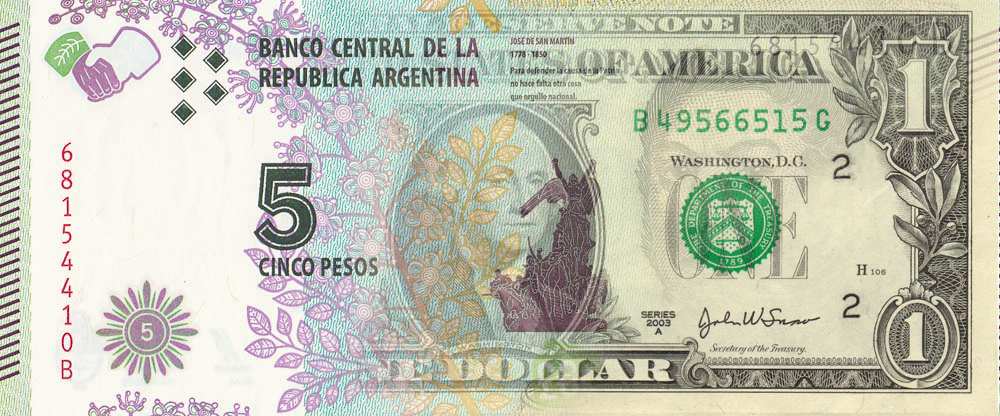On the campaign trail, Mauricio Macri vowed to fight inflation. Now, three years into his administration, it looks like that requires more commitment than he and his team of economic advisors envisioned. Argentina ended 2018 with an annual inflation rate of 47.6 percent. That is the highest rate since the early 1990s, when Argentina’s bout with hyperinflation came to an end. With this in mind, some (including John Cochrane, Steve Hanke, and Mary Anastasia O’Grady) have called for Argentina to abandon the peso in favor of the dollar.
Dollarization became a relevant policy option in Latin America beginning around 2000. Ecuador dollarized in January 2000. El Salvador dollarized in 2001. But Argentina, which had established a currency board in 1991, moved in the opposite direction following its 2001 crisis. On January 6, 2002, it broke its one-for-one peg with the dollar. The results have been disastrous.
The argument for dollarization is relatively straightforward. Argentina has shown itself incapable of managing the money supply appropriately. The annual rate of inflation has averaged an astounding 55 percent since the central bank was founded in 1935. It would do better by outsourcing its monetary policy. Half measures, like adopting a fixed exchange rate or establishing an orthodox currency board, might work elsewhere. But Argentina has in the past broken the promises implicit in those reforms. In order for its commitment to be credible now, it must go all the way. Replacing the peso with the dollar would remove any potential for the central bank to monetize government debts and put pressure on the Treasury to balance its budget. Inflation expectations would plummet. And low and stable inflation would follow.
Straightforward as the reform is, calls for dollarization in Argentina have largely fallen on deaf ears. Some fret about the consequent loss of monetary policy. Some argue that the requisite reforms would make dollarization unnecessary. Those holding such views cling to the possible, while ignoring the probable.
Dollarization and Domestic Monetary Policy
When a country adopts the dollar, it loses the ability to conduct independent monetary policy. It has no control over the supply of dollars in circulation. If the Federal Reserve engages in expansionary monetary policy, dollarized countries get expansionary monetary policy. If the Fed engages in contractionary monetary policy, dollarized countries get contractionary monetary policy. In other words, dollarized countries are stuck with whatever monetary policy the Fed pursues—and there is little reason to think the Fed will take those dollarized countries into account when setting policy.
Those opposed to dollarization see the outsourcing of monetary policy as a cost. They note that a well-functioning central bank might do a better job than the monetary policy imported from abroad. If the demand for money were to increase in Argentina, for example, the domestic central bank could offset the increase in demand with a corresponding increase in supply to prevent a recession. Without a domestic central bank, changes in the demand for money in Argentina are likely to be ignored. Hence, those opposed to dollarization conclude, Argentina would be better off having its own currency managed by a domestic central bank.
There is no denying that dollarization would prevent Argentina from conducting effective monetary policy. But that is hardly a cost if Argentina is unlikely to conduct effective monetary policy anyway. Argentina has not conducted effective monetary policy in the past. And there is little reason to believe it will conduct monetary policy any better in the future. One should not let the perfect be the enemy of the good. The first-best solution, where the central bank carefully manages the supply of pesos, is possible. But it is highly improbable. Therefore, the second-best solution of dollarization is probably the best one can hope for.
Dollarization and the Requisite Institutional Reforms
Dollarization is not a panacea. Argentina faces many problems. Its structural deficit, for example, is out of control. The government spends too much and taxes too little. If Argentina is to prosper going forward, fiscal reform is essential.
But the structural deficit—and corresponding ballooning of outstanding debt—is in large part why peso holders have such high inflation expectations. They worry, quite reasonably, that the central bank will print money to extinguish growing debts, that their deposit balances will be converted to treasury bonds prior to an inevitable default. And, perversely, these high inflation expectations necessitate monetary expansion in order to keep money from becoming too tight. By relieving the underlying pressure responsible for high inflation, those opposed to dollarization claim, the requisite fiscal reforms make dollarization unnecessary.
They are correct, so far as it goes. If the requisite fiscal reform were made, there would be little reason to dollarize. But, once again, one must distinguish the possible from the probable. It is possible that the fiscal authority will submit to the requisite reform despite having access to a central bank that might be called upon to monetize the debt. But the odds of implementing such reforms are much improved when the potential for monetization is removed.
The Case for Dollarization
As noted, dollarization is not a first-best solution. It precludes effective monetary policy. It is unnecessary when a country has its fiscal affairs are in order. For these reasons, dollarization is entirely inappropriate for most countries.
But Argentina is not like most countries. It has a history of fiscal profligacy and monetary mismanagement. It has failed, time and time again, to honor its commitments. As a result, the first-best solution is unobtainable in Argentina. It must settle for second-best.
Fortunately, the second-best alternative of dollarization is quite good—even more so when compared to feasible alternatives in Argentina. Low inflation and the fiscal reforms encouraged by dollarization would allow ordinary Argentinians to flourish once again.





